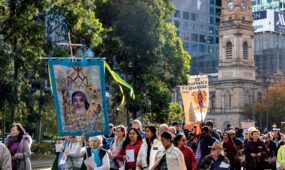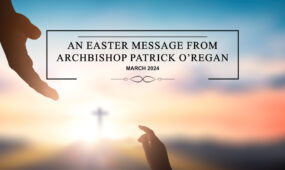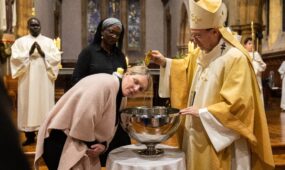Being in the Church, working for the Church: A lay leader's perspective
Opinion
Centacare Catholic Family Services deputy director and Chancellor of the Archdiocese, PAULINE CONNELLY was one of the guest speakers featured in St Ignatius parish’s Lenten forums. She spoke passionately about the role of the laity in the Church in Australia and her hopes for the future.

When Fr Mullins asked me if I would speak tonight, I didn’t hesitate to say yes.
But within a few hours, I began to feel some trepidation.
Things are happening daily if not hourly at each moment in the Church in Australia.
It feels a bit like when you walk out of a dark picture theatre after being very engrossed in a movie and your eyes squint at the bright sunlight and the reality of cars and shops and people are before you and it takes a while for your eyes to adjust.
Advertisement
I feel like the daily news of the exposure of the abhorrent destructive patterns within our Church is like a brilliant spotlight being shone on us, dragging us out of our security net of tradition and what we once would have called our ‘normal’.
In June 2017, I travelled to Medjugorie to do a spiritual pilgrimage with a woman called Immaculee Illibigaza, a survivor of the Rwandan genocide in the 1990’s.
She is an amazing woman having survived the worst of the worst, having faced and witnessed the mutilation of her entire family (except one brother who was out of the state at the time), and spent three months hiding in a small ensuite bathroom with seven other women where she almost starved to death and was tortured by fear as their persecutors tried to find them.
Despair and terror were her constant companions, but during this time Immaculee began to have mystical experiences with Our Lady, which became transformative and led to her complete healing afterwards along with her ability to personally forgive those who massacred her parents and siblings.
I was very excited about this trip to Medjugorie, having read Immaculee’s book and the prospect of spending eight days with her.
I was excited about climbing Apparition Hill and reaching the top where Our Lady has been appearing since the late 1980’s.
(These early apparitions have recently been verified by the Vatican.)
I had visions of a beautiful mystical type of walk, with the sun shining, a grassy path to climb up and the mystical haze of a miracle around me.
When the time came for us to begin the climb, we walked through the village we were staying in and onto the beginning of the hill and I was shocked with what greeted me.
With my troublesome knees how would I ever be able to negotiate this; a path consisting entirely of slippery, angular rocks and small boulders for the entire trip upwards.
There are no hand rails, no easy way, but, there was evidence that others had struggled and found a way.
During this time in the Church, I feel like we are all on that rocky path, trying to find our feet through the jagged pieces of shock, disillusionment, shame, anger and fear, and we keep walking, looking for signs of hope along the way.
On our walk up Apparition Hill, there are hewn into the rocks, the Stations of the Cross, where we were able to stop, rest, and reflect.
Advertisement
The stillness is so important in the struggle.
It certainly is a vulnerable feeling when the structure under your feet feels not as secure as you are used to.
As a lay woman, I don’t have a vested interest in the structures of the church as they exist today. I am not after power or a career in the Church as such.
The Church is a living breathing community, with a clear catechism, but differing views based on a variety of lived experiences and a vast array of relationships; spiritual and temporal, but I believed resuscitation is necessary for this organism and a new life has to be breathed into it.
The events of the last couple of years and for many survivors, the last few decades escalating over the last few months, weeks and days in the Church in Adelaide and in Australia, are challenging me and changing me daily.
I am over being shocked, but I am not desensitised.
I am frustrated beyond belief, I am trying to discover how to most effectively use my voice, I am trying to be an encourager while at the same time, I do not want to minimise people’s experiences.
I am a lay woman in the Church, a lay leader in the Archdiocese, a lover of Jesus, a supporter of the clergy and committed to the wellbeing of the people of God.
I am trying to be a listener. I am trying to offer hope.
I am trying to trust myself to be the person my God wants me to be.
But I feel heavily the constraints of the machinery of the administration and hierarchy of the Church in Rome, and the emphasis on unbroken tradition.
Am I brave enough to publicly challenge some of this?
There have been interviews with some Cardinals and Bishops that I have read, where I feel they are often speaking a language that is not understood, lacking a kindness and relevance with a sense that they are speaking as the ‘other’ to a people aching for reassurance. (I have also read some kind and reassuring interviews.)
And I feel sometimes when the laity speak to our local priests, there is a shared sense of being understood and on the same page, but there is a difficulty also in striving to discover a way forward together, a way that doesn’t take us outside of the Roman way and then, open to censure.
As a woman on the leadership team in the Archdiocese I feel this weight as sometimes crushing.
I want to see a different structure in Rome and throughout the world. A workable structure, an accountable structure, a transparent structure, an open structure.
I want to see a governance structure where the laity have a legitimate governance role. But that is not possible in the short term, although I deeply believe it’s the way of the future.
So, as a lay person I must make a choice and I choose to stay.
I choose to find out who I am in this Church, how I am and what is possible.
I have to search for what it means for me, to be a part of the Catholic Church, to be a lay person in the Church and to be a lay leader in the Church.
I know that the Laity are simply not substitutes; we have our own mission, our own vocation and I believe it’s time we found our collective voice and then a way to use it that doesn’t entail walking away.
We also have a generation of people growing up in the Church today with very different emerging questions than we grew up with.
What is their experience?
They would hope for images of wholeness and relevance and inspiration, things the human heart hopes for, and we have to help them to re-imagine that.
So what does it mean to be a lay person in the Church?
How do we discover our identity as laity and how do we express and experience it?
I remember once reading a quote from a Bishop about his thoughts on the laity and they were to ‘pray, pay and obey’, ‘and we did’ said an older friend of mine.
It jars doesn’t it?
Joan Chittester, a Benedictine feminist religious sister, talks about being both a lover and a challenger of the Church and that every age that is dying is a new age coming to life.
So as lay people we are trying to move forward without the road being defined, as we try to live out the life of Jesus in this time of the 21st century.
I think it needs to be recognised that this is a period for the Church of serious individual stress and trauma as well as a wider reaching community stress within the Church, for both the Clergy and Laity.
There is a deep sense of loss of so much; trust, integrity, clarity, safety, security and respect, and at a time like this, we need to hear that the hierarchy in the Church have compassion for us, the ordinary lay people, as we try to offer compassion to one another.
I think that many of the hierarchy of the Church are so overwhelmed/shocked/shamed and confused that they are themselves negotiating that path of not knowing how to be, along with not knowing how to share this with us.
And growth will happen as we all try and find a way to do that.
In thinking about this, I realised that I cannot begin to define myself as a lay person without considering the clergy and religious.
It’s hard to separate my identity as lay person outside of the context of the priesthood.
It would be like trying to describe what it means to be a sibling without mentioning my brothers or sister.
This identity cannot exist without the other.
If everyone became a priest, what would be missing?
Without the laity the Church would not be the Church that Jesus established.
So for me the experience of being a lay person in the Church is one of being in relationship, with the priest, with my parish community and most of all, with Jesus.
My vocation as a lay person, gives me great accessibility to the public domain, where I can try and live as a witness to Jesus’ way.
I see my vocation as a lay person as one that bears witness to the secular world in a more intense way, because my life is lived in the secular world and I can bring Jesus presence into this world, wherever I am.
I have been challenged by so many people over the last few months about why I choose to stay in this church.
My answer is that it’s the most meaningful way I can encounter Jesus.
I need to separate the problems with the Institution from my spiritual life and enter deeper into the centre of my faith.
I feel like we are living in the time similar to the earliest Church, where the women and men apostles were heckled and attacked for being followers of Jesus, and the toughest thing for me today, is that a lot of the heckling is coming from family and friends who are so angry and let down.
I understand they are not attacking me personally, and I agree with what they are saying about the wrongs of the Church before us, but I want to find another way to deal with it other than having something raging constantly within me.
Joan Chittester speaks of ‘anger being a holy fuel. If you use if right, and you don’t let it get out of control in your life, anger is what can drive you to do good in the face of evil’.
She says that if people are broken hearted and dismayed by what is happening in their institution, then that is a holy concern, a holy anger, but given that, we need prayer, support and time to discern what we feel we should do.
When Fr Richard Leonard spoke at one of these forums a few years ago, he gave us a colloquial summary of St Ignatius Rules for Discernment (d 1556), and one of them which I find relevant for me in the Church at this time is: ‘don’t make a decision when we are down: be careful of emotional haste’.
I find it hard when I hear of friends and family who have decided to leave the Church because of what has been uncovered and the crisis of faith they find themselves in, partly because it challenges my own thinking.
I absolutely understand why they make this decision and I very much respect it, knowing it is a sign they are totally disillusioned.
But I feel sad if they have left because they have felt the Church is so bereft of respect and decency, when that is only a part of the Church’s story.
There is an amazing amount of good still happening in the name of the Church.
As deputy director of Centacare Catholic Family Services I see first hand the work that is done for the most vulnerable and neglected children and adults in our communities.
If our own life mistakes are all people know of us, and we are judged on that, they would not know the true us, or the entire story of us.
I will never find a Church that is not flawed. I will not leave something because I think this something has to be perfect.
But I do need to see evidence from the top that attitudes are changing.
Any group, association or workplace I choose to be part of is flawed, and I operate within that environment, with my own flaws.
I know I will not find a church that is not flawed, but with the Catholic Church through the sacraments, I can enter deeply into the heart of Jesus.
I am no longer blindly obedient, I will continue to be a voice for change, but the most wonderful way I can express my relationship with Jesus is within the Catholic Church.
So, I was baptised into this family, offered to God, anointed a Catholic and I became a member of the Catholic community.
And I love being part of this community.
I experience a deep sense of belonging, but the issue for so many is, if you once experienced this sense of belonging, then the sense of betrayal you feel now is equally as deep when this same Church hurts you.
The level of pain we experience is equal to the level of attachment to a certain thing, so the agony, anguish and wretched pain experienced by victims, is in part due to their once deep and faithful attachment to this Church they once trusted and felt safe in.
And like all family schisms, the elders in the family have to lead the healing process and we need the Bishops of Australia to speak as a combined voice, to us the laity, as a collective.
So I choose to remain part of this more than messy, often obstructive, often narrow larger Church, and I choose my local community, my little Church, because here is where I find ways I can best enjoy and express my relationship to Jesus and my relationship with each of you, my Catholic family.
I choose to examine who I am in relationship to Jesus, and how if He is the light, how I can become a little light, instead of focussing on the darkness of the Church.
If we spend the majority of our time focusing on the darkest areas of our Church, then while we are looking down at that, we are not looking into the eyes of Jesus.
Other people will notice us looking into the darkness, and spend their time doing that also, and soon we will all have our eyes off Jesus and moving toward the hollowness and hopelessness the darkness offers.
Here in St Ignatius Parish at Norwood, as a lay person, I feel at one with the clergy, with the people and I feel I breathe in new life through the liturgies that are so thoughtfully and creatively planned and expressed by all of you.
I am determined to speak against the wrongs of the Church and empathise with those who are suffering because of it; but I yearn to be with Jesus, and I can only truly find that in the most intimate way through the Eucharist, through the beautiful ritualistic sacraments of the Church and through each one of you, my community.
The sacraments become my solace, even though the mistakes made in the name of my Church shake me to the core.
I choose to look at it is through the experiences that lift my heart.
I love the moments in the Church when I encounter Jesus.
My heart burns within when I am with the sisterhood, with women religious, with my spirit filled female friends, whose zeal, honesty, highly evolved and feminist spirituality and joy in Jesus, attracts the light and sparkles within.
I treasure my experiences of grace when I am with faith-filled, generous and loving priests and bishops.
I love the sacraments and the awe inspiring ritual of the Mass.
I love being part of retreats and discussions with the men and women of the Church.
I love it on nights like tonight and during Mass or at Parish gatherings, when we come together, like minded in our faith in Jesus, to pray and experience one another.
I want to try and work towards having a peaceful countenance, a calm presence, be a sign of hope and be an experience of joy, because how else will people be attracted to Jesus, be attracted to the Church, choose to stay in the Church, if we as His followers don’t emulate him?
God remains the same. Jesus remains the same. I trust in that constancy and security.
But I want the Church to change, and when I say the Church, I mean the hierarchy.
I want governance structures to change, I want accountability of episcopal decisions and leadership, and I want kindness, inclusiveness and respect.
I feel for those priests, who, while steeped in the responsibility of running their own parishes, are suffering their own personal crisis or challenges, either at the hands of others or their own inner disillusionment and sadness.
During these last few months and weeks, I have really grappled with how I can be effective in my role as a Chancellor.
When I was first asked several years ago by Archbishop Wilson if I would accept his invitation for me to be a Chancellor in the Archdiocese and to be part of his leadership team, I was a bit starry-eyed.
Archbishop Wilson is a great promoter of women in leadership in the Church, and under his initiative, Adelaide was the first Archdiocese to have lay female Chancellors. The role is normally filled by priests or Religious.
And I must say, even though we haven’t yet made it to the Vatican, I have valued every moment of working with my colleague Chancellors in Jane Swift, Cathy Whewell and Heather Carey, all of whom have since retired.
We could write a book actually, (and who knows!), but I can never thank them enough for the experiences we have shared of grappling together with what it meant for us to be lay female leaders in the Archdiocese of Adelaide, and the honesty and courage we shared in trying to finding our voices and negotiate our way.
But I can say it is really challenging being part of the leadership in the Church as a lay person and a woman.
You have a clear awareness that any authority you think you may have is actually benign, so you work on being an influencer within those limitations.
The facts are the structure does not allow for women leadership in the truest sense, but I generally experience sincerity, good intent and respect from the clergy with which I work, and I am grateful for the women that have gone before me, who would have faced greater hurdles than I, in order for this to be my experience.
I can remember being at one of my first Executive of the Curia (senior leaders of the Archdiocese) meetings many years ago, when the Archbishop was explaining the role of Deacons and how we were planning to ordain Deacons for our Archdiocese.
I said, ‘Archbishop I’d be really interested in doing something like that’.
He looked at me with a curious smile and said, ‘Pauline this is only for men.’
And that was the beginning of my awakening as a female leader in the Church.
But that awakening was a good thing, because once I become aware of the reality of my context, I could then pray, strategise and act.
I speak up. I speak up for women. I speak up for all of you.
I challenge when I feel I’m experiencing clericalism, but I am very careful not to be the empty clanging gong, because my experience as a leader here in the Adelaide Archdiocese is that of being listened to.
Archbishop Wilson was always genuine and sincere in seeking our counsel, and I saw his commitment to our contribution bear fruit.
Bishop Greg as Apostolic Administrator is quite disarming in that he genuinely listens, he remembers, he asks insightful questions, he probes for clarity and truth and upon discernment, he acts.
It’s an experience of being valued, appreciated and included, but I am often wary before opening my mouth, and even though I pray that what I offer is something thought through and wise, I’m frustrated at being wary, because I it comes from years of learned behaviour of experiencing the notion that I am less than in comparison to clergy.
Sr Joan Chittester in her column in the National Catholic Reporter September 20 2018, states that ‘clericalism makes clerics superior to the rest of the Church in power, presumption of holiness, absolute patriarchal authority and as keepers of accountability.’
She speaks of the belief that priests are not like other human beings in that the ontology of the human being is changed by priestly ordination.
She goes onto say that to reserve that for the priesthood obviously distorts the character of the rest of the Church.
In reflecting on this as a lay person and a leader, I’m keen to discover not just the ‘how’ of doing things, but also the ‘why’.
I’ve learned that doing things right is not always doing the right thing, and I have discovered I need an inner freedom in order to shape my thoughts about my role on the leadership team here in the Archdiocese of Adelaide.
I’ve decided to not shy away from the wrongs of my Church or the atrocities committed or the clericalism which I believe is evident, but I am moving deeper into Jesus, deeper into finding my voice as a member of the church, deeper into examining my interior responses to the external happenings.
If we can’t solve the problem, we must not leave the people alone, and we must look for ways that we can assist those who have walked away with heavy hearts.
I feel that for many of the people of God, their patience has worn out, and we need to continue to work on a model of leadership that values collaboration between clergy and laity, based on the pillars of accountability and trust.
It’s risky being compassionate, it’s risky letting go of what you are holding on to in order to be right, it’s risky to enter into another’s place of pain and brokenness when you are grappling with your own painful experiences of being Church.
Joan Chittester, when writing about this time, quotes St Benedict who says, ‘Endure. Hang on. Don’t give up. There’s a purpose in being in this place, in this time’.
She invites us to ‘bear with patience the burden of visions envisioned but not yet accomplished’.
For me it’s a sense of being able to see what can be accomplished, but struggling to know how to make it happen.
For me, the power we have to effect change, is in the moment we are in, with the person we are with.
We can’t change the way of the Church at large, but we are the Church and can begin by looking at what needs to be changed in us, and how can we be a light to the person next to us.
We have to be able to bear this time and climb this hill one slippery rock at a time.
When we experience people’s hostility, when we experience the national anger against the Church that we experience today and we feel it taking a toll on our spirit, for all of us this Lent, remember the gentle way Jesus offers to wash our feet when we are weary, and imagine looking into the eyes of Jesus on the cross. You will feel encouraged and understood.
I read somewhere that often it is the case that the Church only moves forward when forced to.
Let us find our voice. Let that force be us.







Comments
Show comments Hide comments